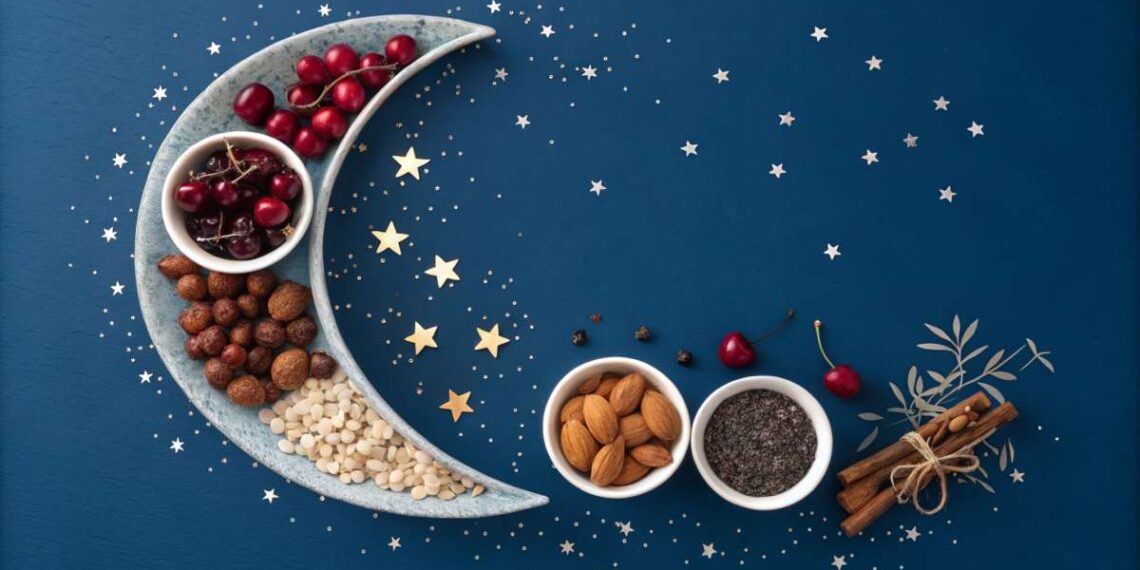Ever found yourself counting sheep at 3 AM, wondering why sleep feels like an impossible dream? The answer might be sitting right on your plate. In a world where 70 million Americans struggle with sleep disorders, the connection between diet and sleep has emerged as a game-changing discovery. From ancient wisdom to modern science, we’re uncovering how specific foods can transform your nights from restless to restorative. Ready to eat your way to better sleep? Let’s dive into the delicious science of slumber.
The Power of Food for Sleep
Getting to Grips with Diet and Shut-eye
Food ain’t just fuel—it’s a ticket to solid sleep. Gobbling up the right snacks might just be your golden ticket to sauntering into dreamland like a boss. Our bodies crave nutrients like melatonin, tryptophan, and magnesium to snuggle into a deep snooze. These sleep superheroes work behind the scenes, helping to sync our z’s with our body’s natural bedtime rhythms. Armed with this knowledge, anyone can mix up their meal choices for some sweet, undisturbed sleep.
Eating smart with goodies like these can nix sleepless nights and boost your body’s natural cozy-time abilities. By zeroing in on munchies that make you snooze, folks can turn every bite into a dream factory. Check out our tips on how to sleep better naturally for more z-catching secrets.
Picking the Sleepytime Snack
Not every nosh is a lullaby in disguise. If you’re planning to up your snooze game, some foods score higher than others. Tanking up on goodies packed with the right nutrients sets you up for the restful downtime your body deserves.
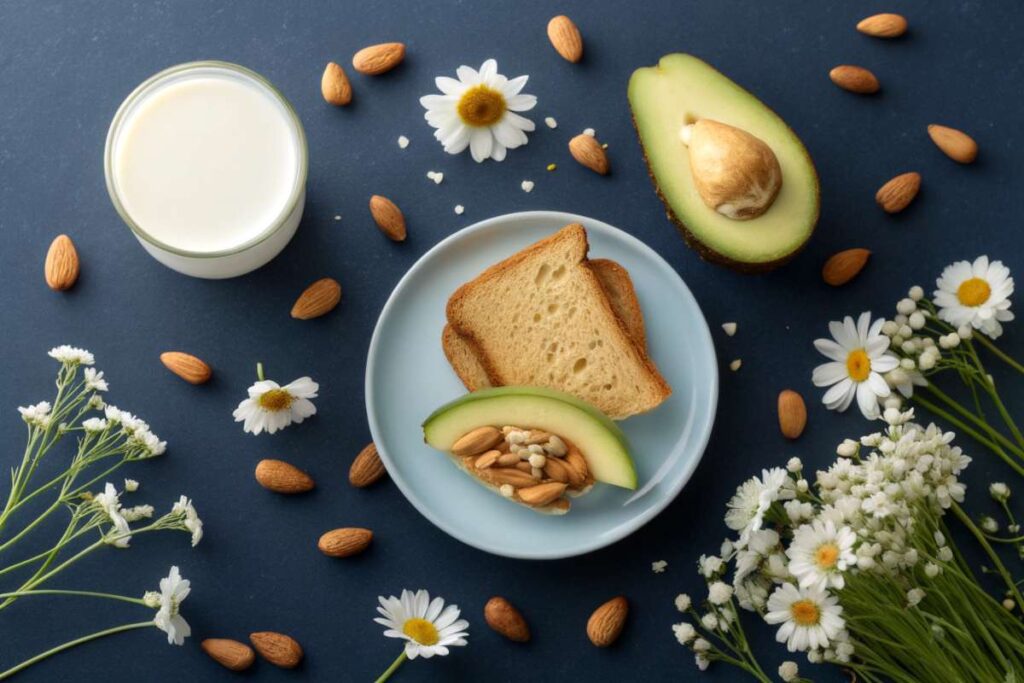
Here’s the scoop on what to chow down on for a better night’s rest:
- Melatonin Buffet: Cherries and almonds can naturally boost melatonin. Easy peasy.
- Tryptophan Treats: Gobble turkey or pumpkin seeds to crank out more serotonin, a big shot in Sleep Town.
- Magnesium Mash: Chow down on spinach and bananas to help your muscles chill out before bed.
Here’s a nifty table to lay it all out—because who doesn’t love a good chart to nail down nap necessities?
| What You Need | Munchies | Why It Rocks |
|---|---|---|
| Melatonin | Cherry Juice, Almonds | Rules sleep cycles |
| Tryptophan | Turkey, Pumpkin Seeds | Boosts serotonin vibes |
| Magnesium | Spinach, Bananas | Chills muscles out |
| Calcium | Yogurt, Cheese | Kicks melatonin into gear |
| Carbs | Whole Grains, Oatmeal | Frees up tryptophan |
Sorting your grub to line up with your snooze alarms not only feeds the bod—it helps you hit the hay better. Round up more easy-peasy sleep tips with our read on herbs for better sleep and discover more ways to boss your bedtime down to the last wink.
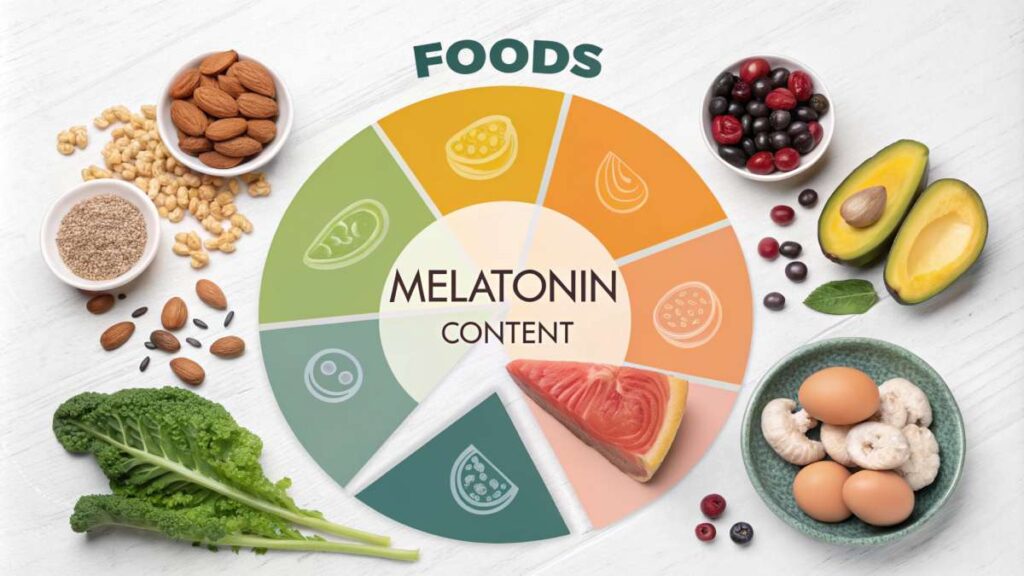
Melatonin-Rich Foods
Chowin’ down on melatonin-loaded goodies might just be the secret weapon you need for hauling yourself into the snoozeland express. If you’re tired of tossing and turning or just wanna amp up your sleep swagger, these tasty tidbits could be a nap-time godsend.
“Studies show that tart cherry juice increases melatonin levels and improves sleep duration and quality by up to 84 minutes per night.” – Journal of Sleep Medicine
Cherry Juice
Cherry juice — yeah, it’s that fun and fruity sidekick that’s more than just a flavor bomb. Sippin’ on this bright red nectar? It might crank up your body’s melatonin army, transforming bedtime chaos into peaceful lullabies. Plus, it’s got that natural sweetness, making it a treat you’ll look forward to. Here’s how it stacks up nutritionally:
| Nutrient | Amount per 1 cup (240 ml) |
|---|---|
| Calories | 140 |
| Carbohydrates | 30 g |
| Sugars | 24 g |
| Melatonin | 0.1 – 0.4 mg |
Almonds
Who knew those crunchy almonds could be your late-night heroes? Packed with melatonin, magnesium, and good ol’ fats, they’ll help ease you into relaxation mode. Magnesium is especially the unsung hero here, making sure your sleep cycles are right on track. Munch on an ounce, get those good vibes, and watch your nighttime funk disappear.
Here’s why almonds are making a splash in the sleep department:
| Nutrient | Amount per 1 oz (28 g) |
|---|---|
| Calories | 160 |
| Protein | 6 g |
| Fat | 14 g |
| Magnesium | 76 mg |
| Melatonin | 0.04 mg |
So next time you’re caught in a sleepless loop, grab some cherry juice, and a handful of almonds, and let nature’s recipe do its magic. Dreamland’s just a snack away! Don’t forget to peek at our doodle on catching Zzz’s naturally for more shut-eye secrets: how to sleep better naturally.
Tryptophan-Containing Foods
Tryptophan, a vital amino acid, is often your ticket to better sleep. Foods stocked with this wonder ingredient can help you chill out and catch some quality Zs. Among the top contenders packing this amino acid are turkey and pumpkin seeds.
Turkey
Turkey isn’t just hitting your holiday table for fun; it’s bursting with tryptophan. This drowsy-making bird gets linked to that sleepy feeling after a feast, and believe it or not, it’s the tryptophan at work, nudging your body to churn out melatonin—the sleep-regulating hormone.
Munch on a 3-ounce serving of turkey, and you’re loading up on enough tryptophan to tip the scales toward better sleep.
| Nutrient | Amount per 3 oz Serving |
|---|---|
| Tryptophan (g) | 0.24 |
| Protein (g) | 25 |
| Calories | 135 |
Whipping up turkey as the hero of your evening meals can not only satisfy your taste buds but also naturally boost your sleeping pattern. Toss it together with more sleep-friendly foods, and you’ve got a recipe for dreamland.
Pumpkin Seeds
Looking for a snack that does more than just curb hunger? Pumpkin seeds might be your next best friend. Besides being little tryptophan powerhouses, they’re loaded with magnesium and zinc—minerals that team up to improve sleep. Perfect for a sprinkle over salads or enjoyed straight from your hand.
A 1-ounce serving of these seeds is tiny but mighty, bringing along nutrients that do wonders for your general well-being.
| Nutrient | Amount per 1 oz Serving |
|---|---|
| Tryptophan (g) | 0.15 |
| Magnesium (mg) | 150 |
| Zinc (mg) | 2.2 |
| Calories | 180 |
Grab some pumpkin seeds to snack on before hitting the hay or throw them into your meal mix—they’ll help you settle in and relax, ready to snooze the night away.
Working foods like turkey and pumpkin seeds into your daily eats can be a simple and down-to-earth method to upgrade your sleep game. Want more easy tips for sleeping better? Check out our article on how to sleep better naturally.
Magnesium-Infused Foods
Everybody needs a good night’s sleep, right? Well, magnesium’s got your back. It’s this nifty little mineral that helps you relax and snooze better. If you’re on a quest to catch those elusive Z’s, munch on some magnesium-packed grub. There’s a heap of these nutritional gems around, but let’s focus on two of the tastiest and easiest to find: spinach and bananas.
Spinach
You might’ve pushed it around your plate as a kid, but spinach is more than just that green stuff your mom forced on you. It’s like a treasure chest of magnesium. Whether you toss it in a salad or sneak it into a pasta dish, spinach’s got a way of making any meal better. Plus, it’s like a natural sleep aid, helping your brain chill out with its top-notch neurotransmitter-regulating powers.
| Nutrient | Amount per 100g |
|---|---|
| Magnesium | 79 mg |
| Calories | 23 |
| Protein | 2.9 g |
| Carbohydrates | 3.6 g |
| Fat | 0.4 g |
Sure, spinach is loaded with magnesium, but it’s also packed with other goodies that keep you ticking nicely. Thinking about jazzing up a smoothie or your favorite soup? Give spinach a whirl! And if you need a few more tips to catch those Z’s, peek at our guide on how to sleep better naturally.
Bananas
Now, bananas – talk about nature’s candy bar. They’re easy to grab and go, plus they bring a sweet touch that makes any snack time a little brighter. Mix them into your breakfast or just peel and eat – they don’t need much dressing up. The magnesium and potassium tag team in bananas do wonders for relaxing your muscles, prepping you for that well-deserved sleep.
| Nutrient | Amount per 100g |
|---|---|
| Magnesium | 27 mg |
| Calories | 89 |
| Protein | 1.1 g |
| Carbohydrates | 22.8 g |
| Fat | 0.3 g |
Not only do bananas set the stage for sleepy time, but they’re also a kick of quick energy. Perfect for when you’re juggling kids, work, or just life in general. And hey, if you’re after even more natural sleep aids, take a gander at our tips on creating a natural sleep environment or using herbs for better sleep.
Calcium Sources
Feeling like your sleep needs a little boost? Calcium’s got your back! It helps your body make melatonin, the magic hormone that tells you when it’s time to snooze. Let’s chow down on a couple of calcium-packed favorites that’ll tuck you in for a peaceful night.
Yogurt
Yogurt isn’t just something you pass by in the dairy aisle—it’s a creamy dream for your taste buds and your sleep schedule. With a healthy dollop of protein and good bacteria from probiotics, it keeps your tummy happy and your Zs uninterrupted. The combo in yogurt is superb: calcium, protein, and probiotics make it a star player in the sleep game.
| Nutritional Component | Amount per 1 cup (245g) |
|---|---|
| Calcium | 448 mg |
| Protein | 12.9 g |
| Calories | 154 |
Add a cup of yogurt to your evening lineup. You can devour it solo, whip it into a smoothie, or jazz it up with fruits and nuts for a bedtime snack that hits the spot.
Cheese
Cheese lovers, rejoice! Here’s your excuse to nibble on your favorite cheese before bed. Loaded with calcium and protein, cheese gets your body ready to hit the hay. Different cheeses, whether it’s sharp cheddar or creamy feta, offer calcium that tags along with protein to make sure your body is ready for rest.
| Nutritional Component | Amount per 1 oz (28g) |
|---|---|
| Calcium | 200 mg |
| Protein | 7 g |
| Calories | 113 |
Sprinkle cheese on your dinner or grab a small piece before bed. A bit of cheddar here, some feta there, cheese has your ticket to the dream realm covered.
Dialing in a diet that’s ready for bedtime just got tastier with these calcium champions. Wanna dive deeper into snooze-inducing tricks? Check out our tips on how to sleep better naturally and herbs for better sleep.
Carbohydrates for Better Sleep
Want to catch more z’s? Turns out, munching on the right carbs can be a game-changer for your snooze. Enter whole grains and oatmeal, your new sleepy-time sidekicks.
Whole Grains
These guys are packed with complex carbohydrates, which work their magic by boosting tryptophan—your gateway to serotonin and melatonin—the sleep dream team. The result? Quality shut-eye. Just sprinkle some whole grains into your dinner plate routine, and watch your body relax into bedtime mode.
| Whole Grain Type | Serving Size | Calories | Tryptophan (mg) |
|---|---|---|---|
| Brown Rice | 1 cup cooked | 218 | 19 |
| Quinoa | 1 cup cooked | 222 | 37 |
| Barley | 1 cup cooked | 193 | 23 |
Got choices! With brown rice, quinoa, or barley, you’re not just eating; you’re preparing for a cozy night. If you’re craving more tips to send you off to dreamland, check out our piece on how to sleep better naturally.
Oatmeal
Oatmeal isn’t just for breakfast anymore. This fiber-loaded bowl of goodness helps keep blood sugar stable, so nighttime hunger doesn’t ruin your z’s.
| Oatmeal Type | Serving Size | Calories | Tryptophan (mg) |
|---|---|---|---|
| Rolled Oats | 1 cup cooked | 154 | 27 |
| Instant Oats | 1 cup cooked | 130 | 25 |
| Steel-Cut Oats | 1 cup cooked | 150 | 33 |
Snuggle up with a warm bowl of oatmeal as a bedtime treat or morning jumpstart. Looking to level up your sleep game even more? Check out our insights on herbs for better sleep and pressure points for sleep.
Adding a few servings of whole grains and oatmeal into your diet can give your sleep that well-needed boost. Smart munching could mean the difference between restless nights and waking up feeling like a million bucks.
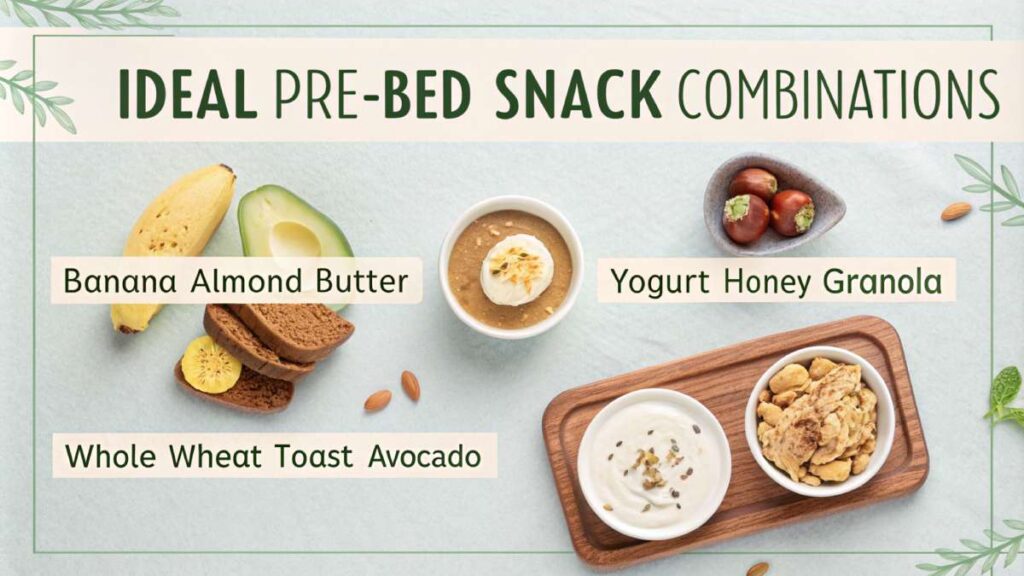
Herbal Sleep Aids
Herbal remedies are pretty handy when you need to catch those elusive Z’s. Chamomile tea and valerian root are two favorites that folks turn to when they want a little help winding down.
Chamomile Tea
Chamomile tea’s got a rep for being a bedtime bestie. This stuff is packed with antioxidants that might just help you kick back and drift off. Sipping on a cup before you hit the hay is a cozy way to end the day.
Here’s a quick look at what’s in chamomile tea:
| Nutritional Component | Amount per 100 ml |
|---|---|
| Calories | 1 |
| Carbs | 0.3 g |
| Protein | 0.1 g |
| Fat | 0 g |
Some say chamomile could improve sleep quality, making it a fan favorite among sleep-friendly foods. Folks who want a mild, natural snooze helper often pick chamomile to ease their jitters and get that relaxation vibe going, setting them up for a restful snooze.
Valerian Root
Valerian root’s got some serious sleep mojo and has been around for ages as a remedy for insomnia. It works its magic by upping the levels of gamma-aminobutyric acid (GABA), which chills out the nervous system, helping you hit the sleep switch.
You can find valerian root in teas, capsules, or extracts. Its soothing effects are a notch above chamomile for some people, giving it an edge as a sleep aid powerhouse.
| Nutritional Component | Amount per 100 g |
|---|---|
| Calories | 325 |
| Carbs | 62 g |
| Protein | 8 g |
| Fat | 1 g |
Adding valerian root to your nighttime routine might help take the edge off and improve how long you actually sleep. Check out our article on herbs for better sleep if you’re curious about more natural sleep tricks.
Both chamomile tea and valerian root can work wonders for those looking to level up their sleep game or cut back on the chemical sleep aids. Whether it’s the occasional restless night or a regular battle with insomnia, these herbal helpers have got your back.
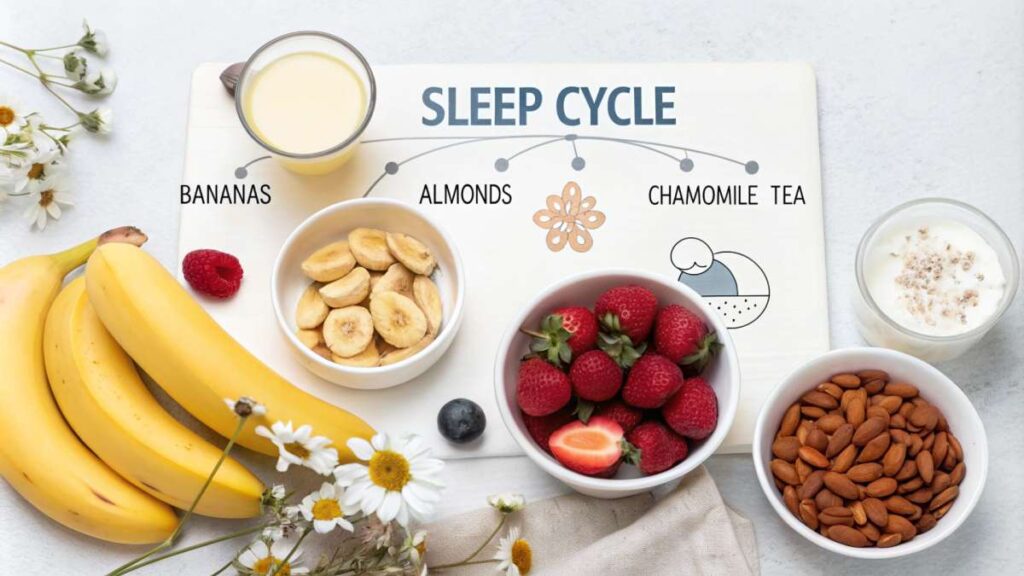
Building Your Sleep-Boosting Diet
Getting more Z’s isn’t just about counting sheep. It’s about adding munchies that whisper “sleep tight” right into your belly. So, how do you tweak your menu for Dreamland? Let’s chew on some ways to sprinkle slumber snacks into your daily grind.
“The food-sleep connection is bidirectional – poor sleep affects food choices, and poor food choices affect sleep quality.” – Dr. Michael Breus, Clinical Psychologist and Sleep Specialist
Incorporating Sleep-Friendly Foods Into Your Daily Routine
Eating your way to snore-town means tossing some snooze-inducing snacks into each meal. But hey, no rocket science here:
| Meal Time | Snooze-Inducing Snacks |
|---|---|
| Breakfast | Oatmeal cozying up with bananas |
| Snack | A handful of almonds or a splash of cherry juice |
| Lunch | Spinach salad just chilling with pumpkin seeds |
| Dinner | Turkey sandwiched between whole grain bread |
| Evening Snack | Yogurt with a sweet honey hug |
Different munchies at different times can make a well-rounded and super chill day. Wanna dig deeper? We’ve got all the juicy deets on how to sleep better naturally.
Tips for Meal Planning for Better Sleep
Cooking up a sleep-tight plan isn’t just for foodies. Here’s how regular folks can dish out dream meals:
- Dinner with a Side of Sleep: Chow down a couple of hours before you hit the hay. Let your belly do its thing far from bedtime.
- Balance is Your BFF: Make sure your plate’s got proteins, fats, and carbs. Keeps the sugar drama outta your system.
- Skip the Gut-Busters: Heavy and spicy—save ’em for daytime. Go light as a feather in the evenings.
- Snack Smart: Midnight snack calling? Reach for those almonds or yogurt, good-for-sleep goodies.
- Hydration, Hydration, Hydration: Sip through the day but go slow on drinks before dozing to keep midnight bathroom trips at bay.
Next time your pillow’s calling, these tasty tweaks might just tuck you in better. And if you’re all about natural fixes, check out our guides on herbs for better sleep and breathing exercises for sleep. Happy snoozing!
Conclusion
Your journey to better sleep doesn’t have to be a pill-popping adventure – it could be as simple as what’s on your fork. By strategically incorporating sleep-promoting foods rich in melatonin, tryptophan, magnesium, and other essential nutrients into your daily menu, you’re not just eating – you’re investing in quality rest. Remember: timing matters as much as food choices, and a well-planned diet can be your ticket to dreamland. Whether you’re sipping on calming chamomile tea or snacking on sleep-supporting almonds, every bite brings you closer to those coveted restful nights. Sweet dreams are made of these – and they’re deliciously achievable.
FAQs
What foods contain the highest levels of natural melatonin?
Cherries, especially tart cherries, nuts like almonds and walnuts, and certain mushrooms are excellent natural sources of melatonin.
When is the best time to eat sleep-promoting foods?
Consume sleep-supporting foods 2-3 hours before bedtime to allow proper digestion and optimal nutrient absorption.
Can certain foods actually prevent sleep?
Caffeine-containing foods, high-sugar items, spicy dishes, and heavy meals can disrupt sleep patterns when consumed too close to bedtime.
How does magnesium improve sleep quality?
Magnesium helps regulate neurotransmitters directly related to sleep, reduces stress, and relaxes muscles for better rest.
Are there any foods that can help with insomnia?
Foods rich in tryptophan (turkey, dairy), complex carbohydrates (oats, whole grains), and calming herbs (chamomile, valerian) can help combat insomnia.
Resources
- Sleep Foundation: Food and Sleep
- National Institutes of Health: Dietary Effects on Sleep
- Harvard Health: Foods That Help You Sleep
- Cleveland Clinic: Sleep-Promoting Foods
- American Sleep Association: Diet and Sleep

